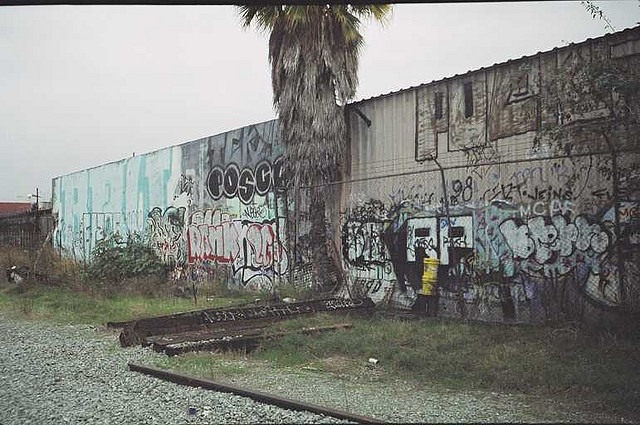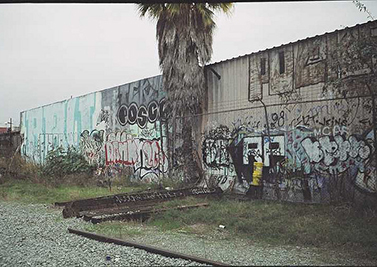
Image from Flickr user under_volcano.
“The study of art that does not result in making the strong less willing to suppress the weak means little.” Booker T. Washington said this in 1886 at the Brooklyn Institute of Arts and Science, later rechristened as the Brooklyn Museum of Art. Washington’s words are writ large on the Museum wall, near the entrance to Kehinde Wiley’s searing solo exhibition. Wiley, who was born in LA and now lives in Brooklyn, focuses on empowerment, putting his “average” black subjects into traditional heroic portraits from Western (white) classical painting. While walking through Wiley’s exhibit I thought of Paul Beatty’s disquieting novel, The Sellout, particularly while watching Wiley’s video “Smile,” which features close-ups of young black men smiling for as long as they can, the smiles starting off as natural, then labored as they hold the unnatural position, evoking thoughts of minstrel shows and forcing a smile in the face of everyday racism. When they can no longer hold their smile, another black man takes their place.
Dickens is so poor and so black that it is literally off the map—so embarrassing that it is officially expunged from the rest of LA.
In The Sellout, a black man from Dickens, a desperately poor agrarian enclave within LA’s South Central slums, has won the judicial lottery and gets to argue his case in front of the Supreme Court. His crimes? Segregating Dickens and bringing back slavery. Beatty, who edited Hokum: An Anthology of African-American Humor, never misses an opportunity to skewer any and all sacred racial cows. What makes The Sellout such a discomforting novel is that Beatty is also dead serious. In this time of Ferguson, Eric Garner, Tamir Rice, voters’ rights push-backs, widening income disparities, and cutbacks to public education, Beatty’s humor pushes right up onto hot-button issues, then jumps up and down on them—gleefully, mercilessly. Beatty’s humor is Richard Pryor and Lenny Bruce: raw and real.
The narrator, nicknamed “the Sellout,” defends his crimes from beginning to end. Born and raised in Dickens, the Sellout was homeschooled by his social-scientist father, who treated his son like a Skinner experiment, conditioning him to fear all authority and police. When his father is gunned down by the police at a routine traffic stop, he inherits his father’s mantle as Dickens’s “Nigger Whisperer,” intervening when the downtrodden and oppressed neighbors threaten to throw themselves off of highway overpasses. He also maintains a farm, where he grows square watermelons, Satsumas so delicious they woo his ex back to him, and killer strains of pot with names like “Ataxia” and “Anglophobia.” He does this with the help of his slave, Hominy, the last remaining Little Rascal, Buckwheat’s understudy, who pines for the days of minstrel shows and blackface.
Beatty’s hero proudly testifies in front of the Supreme Court, saying, “I’ve whispered ‘Racism’ in a post-racial world.”
Dickens is so poor and so black that it is literally off the map—so embarrassing that it is officially expunged from the rest of LA. To put it back on the map, the Sellout paints a white boundary around Dickens. Then, as a birthday present to Hominy, he segregates a city bus that his girlfriend drives so that Hominy can relive the thrills of state-sanctioned discrimination. When crime drops and civic pride among the black and Latino population jumps, the Sellout has a revelation to segregate all of Dickens, from the restaurants to the local school. He starts by putting up fake signs for the Wheaton Academy, an all-white charter school to be built across the street from the all-black and Mexican local public school. He then works to convince his old friend, Charisma, who runs the school, to segregate it.
If it is touched by race—and what in this country is not?—then it is fair game.
Beatty, who started off as a poet and was the first Grand Slam Poetry Champion of the Nuyorican Poets Café back in 1990, has a poet and performer’s sense of play. He spins long, damning jokes out of familiar material, turning what we thought we knew inside out. Nothing is safe from his withering humor, from “Dave Eggers’s do-gooder condescension,” to Clipper fans and The Clash: if it is touched by race—and what in this country is not?—then it is fair game. Whereas Claudia Rankine’s Citizen is a painfully exacting poetic treatise on the effects of micro-aggressions, Beatty’s novel is a treatise on the history of macro-aggressions, the blunt trauma of what institutional racism has done and continues to do to all of our citizens. At the end, Beatty’s hero proudly testifies in front of the Supreme Court, saying, “I’ve whispered ‘Racism’ in a post-racial world.”
Lest you think that this novel is a lighted-hearted romp, the narrator himself will correct you: “This traffic-court jester did more than tell jokes; he plucked out your subconscious and beat you silly with it, not until you were unrecognizable, but until you were recognizable.” I imagine that Booker T. Washington would approve, as The Sellout passes his artistic test with flying colors.
